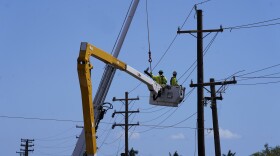The U.S. House has passed a massive spending bill that could kick off a surge in commercial solar business — but Hawaiʻi’s solar industry isn’t celebrating.
If the Republican-led measure makes it through the Senate and President Donald Trump signs it into law, clean energy companies would need to break ground on new commercial projects within 60 days of the bill’s signing to be eligible for certain tax credits.
A short-term surge in commercial solar installations may occur if companies race to get their projects in the ground before the deadline.
But Josh Powell, the CEO of the solar company RevoluSun, said Hawaiʻi’s solar landscape isn’t built to accommodate a sudden spike in commercial business.
For instance, RevoluSun usually has to wait six to eight months just to get county approval for a new commercial project on Oʻahu. And a rush for resources to launch new projects could make certain products scarce, which may drive up prices.
“We expect scarcity in the second half of the year because of the surge that's likely nationwide,” Powell said.
The reconciliation bill would also put the residential solar market on a tight timeline because federal credits that support rooftop solar would sunset at the end of this year.
And under the bill’s current language, third-party investors in rooftop solar systems would no longer be eligible for a tax break.
Third-party owned solar, in which a company or investor leases a system to a household, has helped low-to-moderate income residents lower their electricity bills through rooftop solar without having to pay the upfront costs for installation, said Gwen Yamamoto-Lau, the executive director of the Hawaiʻi Green Infrastructure Authority.
“The loss of the solar tax credits will disproportionately hinder lower-income households and other underserved ratepayers in accessing rooftop solar,” she said. “Without the solar tax credits, investors will not invest in third-party owned systems for ALICE [Asset Limited, Income Constrained, Employed] households.”
Ted Peck is the president of the solar company Holu Hou Energy, which focuses on rooftop solar installations for multi-dwelling units and low-income households. He said the withdrawal of federal incentives is going to slow the solar market’s transition to serving more low-to-moderate income communities.
“All the rich people, they've already built their systems. So this is really going to penalize people that typically are on the trailing edge of adoption.”

The rollback of federal support for solar and other clean energy markets comes as companies are bracing for the impacts of tariffs.
“A lot of the manufacturers are telling us, hey, price increases are coming,” said Will Giese with the Solaray Corporation.
He said that despite the threat of higher prices, solar companies are still feeling the pressure to build new systems before the federal government eliminates its tax credits.
Meanwhile, Hawaiʻi may sunset an important state-level renewable energy incentive. Lawmakers have sent a measure to Gov. Josh Green that would wind down a tax credit for renewable energy in the next five years. Several clean energy stakeholders are calling on the governor to veto the measure.
A triple whammy of tariffs, cuts to federal incentives, and the elimination of the state-level energy tax credit could put Hawaiʻi’s solar market in a perilous spot by the end of the year, Giese told HPR.
“I would be surprised if the current industry in Hawaiʻi that exists today, the amount of jobs that it has, exists in six months,” he said.
“Maybe we'd get this kind of artificial boost in the next few months, as people try to essentially get a run on the banks and get in before the party is over. But Christmas looks pretty grim.”
Hawaiʻi Public Radio exists to serve all of Hawai‘i, and it's the people of Hawai‘i who keep us independent and strong. Help keep us strong to serve you in the future. Donate today.





